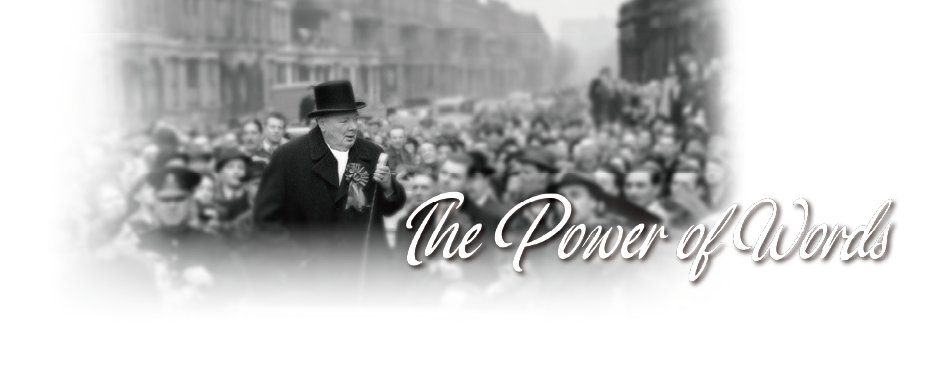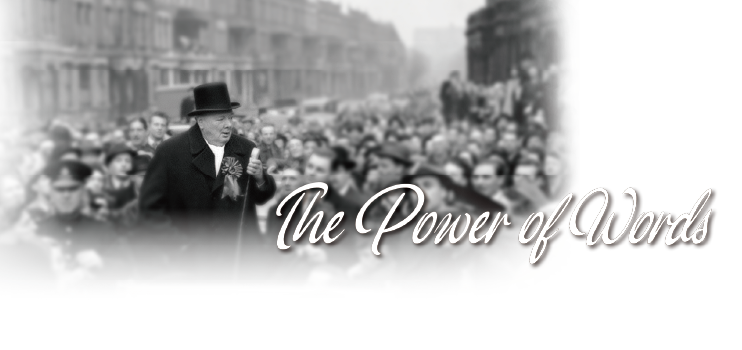

Best remembered as a wartime Prime Minister, Winston Churchill is widely revered for his leadership in bringing victory to Britain over the Germans during World War II. Equally impressive, though less known, is the literary achievement of this great statesman. In 1953, Churchill was awarded the Nobel Prize in Literature “for his mastery of historical and biographical description as well as for brilliant oratory in defending exalted human values”.
Churchill was well aware at a young age of the profound significance and the overwhelming impact of words, evident in his article “The Scaffolding of Rhetoric”. Written when he was just twenty-three, this essay says, “Of all the talents bestowed upon men, none is so precious as the gift of oratory. He who enjoys it wields a power more durable than that of a great king.” It was not until 10 May 1940 when Churchill succeeded Neville Chamberlain as the Prime Minister of the United Kingdom that the unfolding of extraordinary events vindicated his belief in the magical power of words.
On the very same day when Churchill took the baton from Chamberlain, the Battle of France broke out. With German invasion of France and the Lower Countries, the situation for Britain had become more perilous and precarious than ever. Three days later, when the new Prime Minister gave his inaugural speech to the House of Commons, he found himself in a fragile political position: War was imminent and there was a lack of trust in his leadership. The speech he gave sought to unite the nation in preparation for war and ask for a vote of confidence in his new government.
“I have nothing to offer but blood, toil, tears and sweat.” Churchill uttered the words that now adorn the back of £5 notes. He addressed the public’s fear of war, not through empty assurances, but by confirming and even sensationalising the challenges and difficulties to be faced by the people of Britain: “We have before us an ordeal of the most grievous kind. We have before us many, many long months of struggle and of suffering.” He framed the war with Germany as a struggle for survival, and was adamant that no matter how hard and bitter the struggle would be, Britain would eventually prevail: “What is our aim? I can answer in one word: it is victory, victory at all costs, victory in spite of all terror, victory, however long and hard the road may be; for without victory, there is no survival.” The determination and spirit of resistance resonated across the nation and the world. The appeasement policy pursued by the British government since the rise of Hitler was finally abandoned.
Almost everything looked bleak and hopeless in early June. When France was on the brink of capitulation, the only comforting news was the successful evacuation from Dunkirk. In his efforts to boost the popular morale, Churchill made one of his most famous wartime speeches to the House of Commons on 4 June. He struck a confident note that the British people would prove themselves once again able to defend their home, “if necessary for years, if necessary alone”. This speech ended with a sense of remarkable defiance: “We shall fight on the beaches, we shall fight on the landing grounds, we shall fight in the fields and in the streets, we shall fight in the hills; we shall never surrender …” And most importantly, it reiterated an unwavering and uncompromising commitment from Britain that even if she was defeated her navy would carry on the struggle: “Our Empire beyond the seas … would carry on the struggle, until … the New World, with all its power and might, steps forth to the rescue and the liberation of the old.” His vow to fight until the end did not just buoy the spirit of the nation, but also proved crucial to securing support and assistance from the United States in early 1941, which at first doubted if the British would strike back.
When the news came through on 17 June that France had surrendered, there was an outbreak of pessimism and even defeatism across Britain. On the following day, Churchill delivered his “Finest Hour” speech to the House of Commons amid this crisis of confidence. Instead of dwelling on the colossal losses incurred in the Battle of France, he reviewed the forces currently available for home defence in a matter-of-fact manner and reassured his people: “If invasion has become more imminent, we … have far larger and more efficient forces to meet it.” Through his classic use of powerful metaphors, he warned of the grim consequences of subjugation by the Germans, which he thought of as tantamount to sinking into “the abyss of a new Dark Age”. He ended by solemnly reminding his audience that posterity would have judgement about how well the men of this generation had done: “If the British Empire and its Commonwealth last for a thousand years, men will still say, ‘This was their finest hour.’”
By delivering the most stirring words, Churchill rallied his people together to defend against invasion, boosting morale and empowering the nation to fight alone at the darkest hour. In the words of Edward Murrow, an American journalist, Churchill “mobilised the English language and sent it into battle”. This shrewd comment about the remarkable oratory of Churchill perhaps best encapsulates the amazing power of words.











